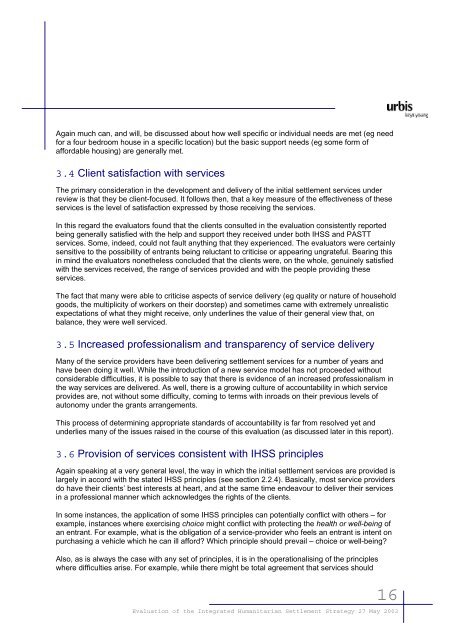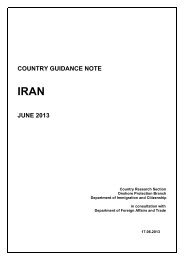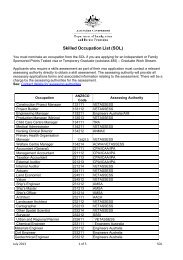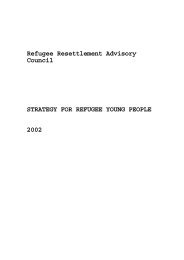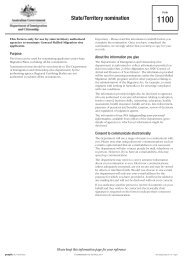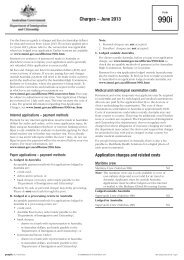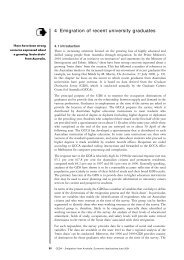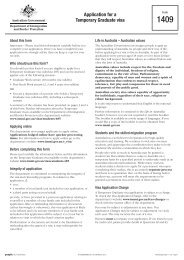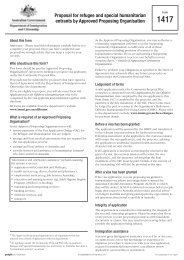Evaluation of the Integrated Humanitarian Settlement Strategy (IHSS)
Evaluation of the Integrated Humanitarian Settlement Strategy (IHSS)
Evaluation of the Integrated Humanitarian Settlement Strategy (IHSS)
You also want an ePaper? Increase the reach of your titles
YUMPU automatically turns print PDFs into web optimized ePapers that Google loves.
Again much can, and will, be discussed about how well specific or individual needs are met (eg need<br />
for a four bedroom house in a specific location) but <strong>the</strong> basic support needs (eg some form <strong>of</strong><br />
affordable housing) are generally met.<br />
3.4 Client satisfaction with services<br />
The primary consideration in <strong>the</strong> development and delivery <strong>of</strong> <strong>the</strong> initial settlement services under<br />
review is that <strong>the</strong>y be client-focused. It follows <strong>the</strong>n, that a key measure <strong>of</strong> <strong>the</strong> effectiveness <strong>of</strong> <strong>the</strong>se<br />
services is <strong>the</strong> level <strong>of</strong> satisfaction expressed by those receiving <strong>the</strong> services.<br />
In this regard <strong>the</strong> evaluators found that <strong>the</strong> clients consulted in <strong>the</strong> evaluation consistently reported<br />
being generally satisfied with <strong>the</strong> help and support <strong>the</strong>y received under both <strong>IHSS</strong> and PASTT<br />
services. Some, indeed, could not fault anything that <strong>the</strong>y experienced. The evaluators were certainly<br />
sensitive to <strong>the</strong> possibility <strong>of</strong> entrants being reluctant to criticise or appearing ungrateful. Bearing this<br />
in mind <strong>the</strong> evaluators none<strong>the</strong>less concluded that <strong>the</strong> clients were, on <strong>the</strong> whole, genuinely satisfied<br />
with <strong>the</strong> services received, <strong>the</strong> range <strong>of</strong> services provided and with <strong>the</strong> people providing <strong>the</strong>se<br />
services.<br />
The fact that many were able to criticise aspects <strong>of</strong> service delivery (eg quality or nature <strong>of</strong> household<br />
goods, <strong>the</strong> multiplicity <strong>of</strong> workers on <strong>the</strong>ir doorstep) and sometimes came with extremely unrealistic<br />
expectations <strong>of</strong> what <strong>the</strong>y might receive, only underlines <strong>the</strong> value <strong>of</strong> <strong>the</strong>ir general view that, on<br />
balance, <strong>the</strong>y were well serviced.<br />
3.5 Increased pr<strong>of</strong>essionalism and transparency <strong>of</strong> service delivery<br />
Many <strong>of</strong> <strong>the</strong> service providers have been delivering settlement services for a number <strong>of</strong> years and<br />
have been doing it well. While <strong>the</strong> introduction <strong>of</strong> a new service model has not proceeded without<br />
considerable difficulties, it is possible to say that <strong>the</strong>re is evidence <strong>of</strong> an increased pr<strong>of</strong>essionalism in<br />
<strong>the</strong> way services are delivered. As well, <strong>the</strong>re is a growing culture <strong>of</strong> accountability in which service<br />
provides are, not without some difficulty, coming to terms with inroads on <strong>the</strong>ir previous levels <strong>of</strong><br />
autonomy under <strong>the</strong> grants arrangements.<br />
This process <strong>of</strong> determining appropriate standards <strong>of</strong> accountability is far from resolved yet and<br />
underlies many <strong>of</strong> <strong>the</strong> issues raised in <strong>the</strong> course <strong>of</strong> this evaluation (as discussed later in this report).<br />
3.6 Provision <strong>of</strong> services consistent with <strong>IHSS</strong> principles<br />
Again speaking at a very general level, <strong>the</strong> way in which <strong>the</strong> initial settlement services are provided is<br />
largely in accord with <strong>the</strong> stated <strong>IHSS</strong> principles (see section 2.2.4). Basically, most service providers<br />
do have <strong>the</strong>ir clients’ best interests at heart, and at <strong>the</strong> same time endeavour to deliver <strong>the</strong>ir services<br />
in a pr<strong>of</strong>essional manner which acknowledges <strong>the</strong> rights <strong>of</strong> <strong>the</strong> clients.<br />
In some instances, <strong>the</strong> application <strong>of</strong> some <strong>IHSS</strong> principles can potentially conflict with o<strong>the</strong>rs – for<br />
example, instances where exercising choice might conflict with protecting <strong>the</strong> health or well-being <strong>of</strong><br />
an entrant. For example, what is <strong>the</strong> obligation <strong>of</strong> a service-provider who feels an entrant is intent on<br />
purchasing a vehicle which he can ill afford? Which principle should prevail – choice or well-being?<br />
Also, as is always <strong>the</strong> case with any set <strong>of</strong> principles, it is in <strong>the</strong> operationalising <strong>of</strong> <strong>the</strong> principles<br />
where difficulties arise. For example, while <strong>the</strong>re might be total agreement that services should<br />
16<br />
<strong>Evaluation</strong> <strong>of</strong> <strong>the</strong> <strong>Integrated</strong> <strong>Humanitarian</strong> <strong>Settlement</strong> <strong>Strategy</strong> 27 May 2003


